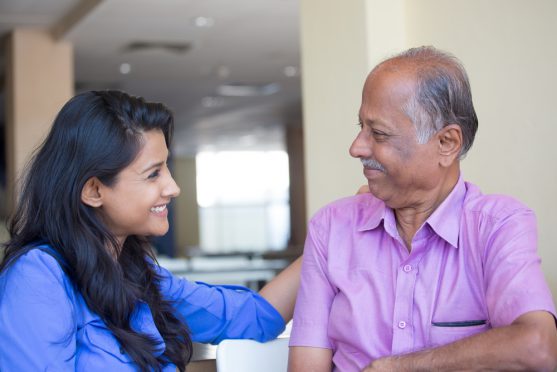If your loved one is a cancer patient or survivor, you might be able to identify with the situations mentioned below.
Excerpt from a real conversation between breast cancer survivor Anjali Gadoya and her friend:
Friend: You look fine now. Are you completely cancerfree?
Anjali: Yes, I’m perfectly fine now.
Friend: That’s great. Good to see you like this.
Anjali: Thank you. But those were difficult days you know, when I was going through chemotherapy… no one extended their support… no one even called to check on me..
Friend: Don’t talk about all that now. What’s the point of thinking upon the past? Let it go. Forget about it.
To many of us, it might sound like the friend is trying to motivate Anjali to be positive and not dwell on unpleasant memories from the past. But to Anjali, and to many other cancer survivors, it will sound like their voice is being stifled.
We celebrate when someone completes their cancer treatment. They ring the bell after their last round of chemotherapy. Their family celebrates with a party and gifts. And these are good gestures to make the cancer patient feel more loved.
However, there is something else we need to do to make them feel accepted, we need to let them talk, even about topics that make us uncomfortable.

Talking about cancer is not a negative thing. It is the first step in the process of emotional healing that every cancer patient requires. Each time that they are able to freely express themselves and talk about the good, bad and ugly aspects of cancer, they are able to let go of their pent up emotions a little bit more.
By shutting them up, we as caregivers, friends and family, are not doing them any favour. We are communicating to them that we don’t want to know how they felt. We don’t want to acknowledge that it was difficult for them.
Why is it so hard for us to listen to them?
Most caregivers who avoid talking about cancer do so with the right intentions. We feel recalling bad experiences will be painful for the cancer survivor. We want to spare them (and ourselves) from reliving all those terrible moments that we feel are best forgotten. Afterall, what good can it do to keep repeating those instances? Is it not best to move forward, to talk about happy things, and to be cheerful?
Agreed. It is best to move forward and to be cheerful. But is your cancer fighter able to move forward? Maybe for them to ‘get over’ those memories, they need to first process them.
And the first step to processing those feelings is to talk about them. They need someone to share those feelings with; someone who will not judge them as being attention-seeking, or negative or selfish.
Initially, it can be annoying to have to listen to all of those complaints again. It might bring your spirits down. But you will find that after going through those events repeatedly, the narrative starts to become a little less bitter. What started off as a pity party on how horrid the experience was for them, will slowly begin to include the experiences of others as well. This change might take time but it is a sure sign that they are feeling better emotionally.
As a caregiver, it is twice as painful. Firstly, cancer also affects your life and health, even if you are not the patient yourself. Secondly, you find that the patient you have been caring for night and day, has turned cold and ungrateful towards you.
It is perfectly understandable that you need to take care of your own emotions as well at this time. You might not want to recall these memories and not talking about cancer might seem ideal to you.
The answer might lie in striking a balance between your emotional needs and those of your cancer fighter. Allow them to vent and when you don’t want to hear anymore, find them other ways to express themselves. They could write down their experiences, or they would make voice recordings of how they feel.
There are many cancer support groups that encourage cancer patients and survivors to speak openly about how they feel. Joining such groups might help your cancer fighter feel lighter and more accepted.
Onco.com has a support group called Talk Your heart Out, where cancer patients, survivors and caregivers can meet like-minded people who understand them better. You can try attending a session to see if this helps you feel better.
Watch what our survivors have to say about support groups:
You can take the help of a professional therapist, if required. They can help both of you come to terms with what has happened and how it can affect your future.
Forming a mutual support system
Like any life-altering experience, cancer too can either bring a family together to pull them apart. The struggle with cancer is not quite over once you ring the bell in after the last cycle of chemotherapy. You might find yourself being a ‘caregiver’ long after the patient is physically fine again. It could make you resentful, particularly when you do not find it a rewarding experience.
Here are some things to remember when you feel particularly downcast:
- It’s not you. Remember that there are limitations to what you can do as a caregiver. You cannot control everything. So learn to accept the things you cannot change.
- It’s not them either. Your cancer fighter is not being particularly difficult on purpose. You will find that all cancer patients and survivors react in a similar pattern during and after their treatment.
- Take care of yourself first. Take a break when you need to. Make sure you practice some form of self-care daily, to strengthen as well as relax yourself.
- Let them be. Your cancer fighter will take time before they can truly recover from what they have been through. You cannot make it happen. It will happen when it does.

Finally, remind yourself and your cancer fighter that you’re in this together. You’ve seen some of the worst times together and now you can plan on seeing much better time together.



